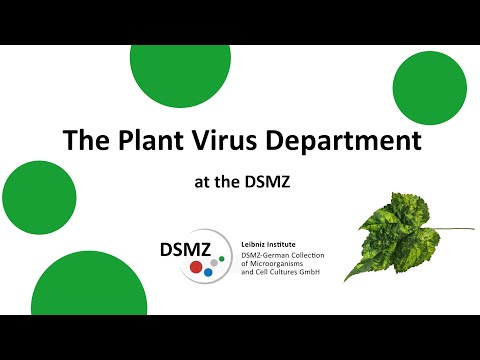❗️🆕 Don’t miss this short introduction to the work of the DSMZ plant virus department
👉 https://www.youtube.com/watch?v=C3_nSwHWV9E

❗️🆕 Don’t miss this short introduction to the work of the DSMZ plant virus department
👉 https://www.youtube.com/watch?v=C3_nSwHWV9E

After almost 30 years of active research, the head of our Department of Plant Viruses 🦠🌱 is retiring - at least a little 😉
Read the full interview with Dr Stephan Winter here 👉 https://tinyurl.com/26fyteax
#planthealth #cassava #plantvirus #sciencecampusbs #biodiversity
SatRNAs - the 'game changers' at the virus–host plant interaction?
After years of working with satellite RNAs, we wrote this synthetic and critical paper, with both historical and most recent data, as well as hypotheses and prospects for further research
#plantbiology #biology #science #nature #virus #plantvirus #virology #plantscience
Welome to the DSMZ - EVAg - Workshop "Advanced methods in virus diagnosis - from serology to high throughput sequencing"
Scientists from agricultural research institutes focusing on plant virus diagnosis meet at the DSMZ to collectively work on plant diseases and viruses infecting plants, to share experience and advance knowledge and expertise in virus detection and diagnosis.
#workshop #braunschweig #sciencecampusbs #plantvirus #planthealth #data
Viruses Of Plants And Animals
#AnimalVirus, #DiscoveryOfVirus, #PlantVirus, #TMV, #TobaccoMosaicVirus, #Virus, #VirusProperties #Virology Viruses of plant and animal differ greatly in shape. They do not have some characteristic morphology as shown by bacteriophages.…. Medical Microbiology & Recombinant DNA Technology (RDT) Labs | Read More -
https://micrordt.wordpress.com/2024/05/04/viruses-of-plants-and-animals/
Cultivation Of Plant Virus
#Cultivation, #CultivationOfVirus, #PlantVirus, #Virus #Virology Plant virus can be cultivated by direct mechanical Inoculation of virus suspension by rubbing on leaves of living plants. This…. Medical Microbiology & Recombinant DNA Technology (RDT) Labs | Read More -
https://micrordt.wordpress.com/2024/04/20/cultivation-of-plant-virus/
When viruses have segmented genomes, the set of frequencies describing the abundance of segments is called the genome formula. The genome formula is often unbalanced and highly variable for both segmented and multipartite viruses. A growing number of studies are quantifying the genome formula to measure its effects on infection and to consider its ecological and evolutionary implications. Different approaches have been reported for analyzing genome formula data, including qualitative description, applying standard statistical tests such as ANOVA, and customized analyses. However, these approaches have different shortcomings, and test assumptions are often unmet, potentially leading to erroneous conclusions. Here, we address these challenges, leading to a threefold contribution. First, we propose a simple metric for analyzing genome formula variation: the genome formula distance. We describe the properties of this metric and provide a framework for understanding metric values. Second, we explain how this metric can be applied for different purposes, including testing for genome-formula differences and comparing observations to a reference genome formula value. Third, we re-analyze published data to illustrate the applications and weigh the evidence for previous conclusions. Our re-analysis of published datasets confirms many previous results but also provides evidence that the genome formula can be carried over from the inoculum to the virus population in a host. The simple procedures we propose contribute to the robust and accessible analysis of genome-formula data.
The accepted (before proof) version of our first #2024 #article is available online:
The #Dicer-like Protein 4 and RNA-dependent RNA Polymerase 6 are Involved in Tomato Torrado #Virus Pathogenesis in #Nicotiana benthamiana
Published in #Plant and #Cell #Physiology and funded by #NCN #Sonata
#science #plantscience #plantvirus #virology #plantvirusinteraction #PTGS #RNAi #torradovirus
Abstract. Tomato torrado virus (ToTV) is a type member of the Torradovirus genus in the Secoviridae family known to cause severe necrosis in susceptible tomato